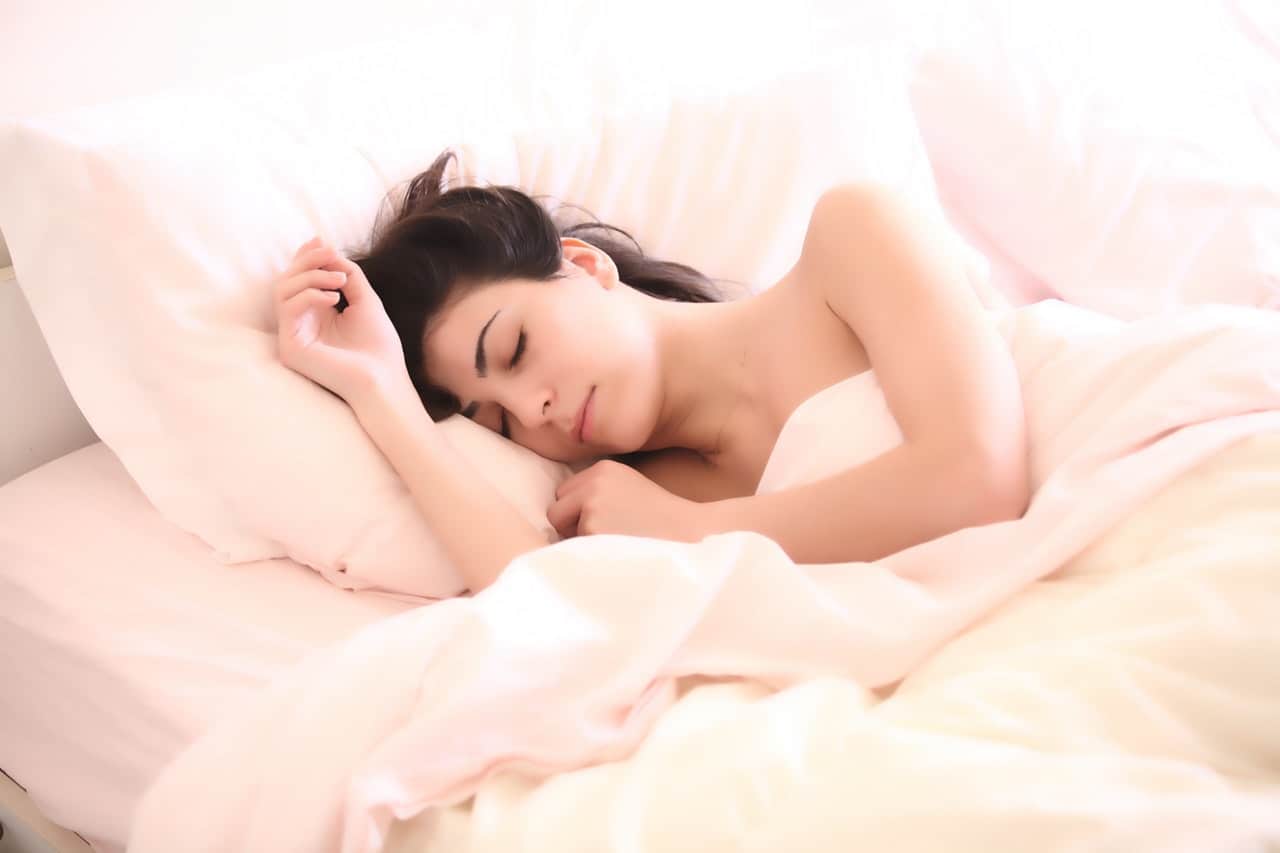We all know how important sleep is. It’s good for energy, focus, positive thinking, immunity, and overall health. That’s why many of us form certain bedtime habits that help us get to sleep or make us feel cozier.
But sometimes, these habits are ill-informed ones that can have adverse effects elsewhere. If you’ve been waking up to irritated skin and breakouts, it may be time to take a good, long look at what you do before you hit the sack.
Here Are 8 Bedtime Habits That Are Bad For Your Skin

1. Not Changing Sheets Often Enough
No matter how clean your sheets seem to be, the fact remains that sleeping on them every night causes quite a bit of dirt to pile up on them. Every single piece of bedding you have can slowly collect oil and dirt from your body, which can lead to pimples. It’s no wonder it’s so bad for your skin!
According to medical doctor and dermatologist Desmond Shipp, using the same pillowcase nightly without changing it is a surefire way to contaminate it with shed skin cells, bad bacteria, and the residue from your day. Every bit of dirt you have picked up will end up sticking to that pillow, especially matter you have acumulated on your hair.
Just imagine it – the average person only spends 8 hours every night asleep. That makes 16 hours that they could have spent wandering around and accumulating gross impurities that can then be transferred to sheets!
Dermatologist Dr. Jill Waibel recommends washing all bedding at least once every week. If washing all your bedding is a bit much or takes too much time, at least swap out your pillowcases weekly to avoid acne and skin irritation.
2. Sleeping with Incorrect Temperatures
Temperature is a surprisingly important part of ensuring a healthy bedtime. The incorrect temperature can have noticeably adverse effects on the skin, and it can even impact overall sleep quality.
If your room is too warm, or if you tend to be hot to begin with, you will sweat through the night. If you’re lucky, you won’t wake up from that sweat, but even if you don’t, that means your sheets are going to get dirty quickly.
- Sweating releases bacteria, dirt, dead skin, and oil on the skin’s surface or trapped in its pores.
- Feeling cozy is great, but let it get too warm and you’ll be sweating up a storm.
- Even on cold nights, pushing up the heat can lead to drying effects on the skin.
But what about a room that’s too cold? This is, supposedly, just as bad. A cold room can lead to dry skin. This is because this type of cold, especially with air conditioning involved, basically sucks moisture from your skin. For most positive results, your bedroom should be at a comfortable temperature that isn’t too hot or too cold.
Does this mean your room should never be cool at all? Of course not! In fact, studies have found that the body is able to enjoy better results from sleep when resting at cooler temperatures. Just don’t overdo it, and all will be well.
Absolutely can’t give up your AC or heating? Invest in a humidifier that can replace lost moisture so your skin doesn’t dry out as you snooze.
3. Skipping Skincare
Some may choose to brush off their skincare routines at night. It may be because they feel too tired to perform them, or maybe they just don’t consider it very important. But this is a huge no-no.
To begin with, for those who wear makeup, not taking it off before hopping into bed is a surefire way to wind up with pimples the next day. But we’re not just talking about makeup here.
A nightly face wash is one of the most important things you can do for your skin. Even if you’re not wearing makeup or think you don’t need it, your skin desperately needs this cleanse. As you sleep, skin works to repair and rebuild itself. So if you have dirt, dust, and other items on your skin, you will harm this usually positive process.
You should also try not to skip out on moisturizer. Even those with oily skin can and should benefit from this type of product. It’s not just meant for anti-aging purposes, and it’s definitely not only for dry skin. Just go for products formulated specifically for your skin type, and you’ll enjoy glowing, dewy, youthful skin every morning.
- Do keep in mind, though, that you should never over-cleanse your skin. This can tear down the microbiome over the skin and break down the natural protection and moisture that your skin naturally has.
- Stick to doing just enough to get bad residue off, and not too much to where you get rid of good bacteria that protects you from acne and infection.
4. Sleeping With Long Hair Down
It might be difficult to sleep with your hair tied up. It can feel uncomfortable and get in the way of some sleeping positions. But sleeping with your hair down leaves the skin on your face more susceptible to trouble. Long hair will leave oil, residue, and even hair care products on your facial skin, causing pore clog and redness.
According to board-certified dermatologist Joel Schlessinger, just wearing your hair wrongly to bed can lead to angry breakouts when you wake up. Your best bet is to tie up your hair in a ponytail or a bun; keep the tie loose and cozy so you don’t damage the roots of your hair.
If your hair is particularly curly, use a satin cap to protect it, stopping breaks from occurring while keeping those curls fresh. Plus, the smooth satin of that cap can help your skin suffer less from potential breakouts.
5. Using Rough Pillowcases
We don’t always pay attention to pillowcases and their specific materials and textures. But rough ones – especially those made of pure cotton – can be overly coarse and cause friction on your facial skin as you sleep. It can lead to collagen breakage, wrinkle formation, and even acne.
Your best bet for pillowcases are ones made with silk or satin. These smooth materials are guaranteed to help keep your facial skin safe and protected, and they even have positive effects on hair. They are less harsh and abrasive, are not as prone to cause irritation, tend to be hypoallergenic, and are, on the whole, a lot more breathable.
6. Sleeping On Your Stomach or Side
There are many sleeping positions, and everyone has their own personal preference. But opting to sleep on your stomach or side comes with its fair share of negatives.
First, let’s talk about stomach sleeping. According to clinical psychologist and medical doctor Michael Breus, stomach sleeping can lead to wrinkles due to the pressure of your face against a pillow. This is so severe that those who sleep this way are likely to have more obvious lines in their foreheads.
On top of that, it’s not a great position for your back, either; additionally, smothering your skin in a pillow can cause breakouts. You may even start to see wrinkles along your neck and chest if this is your go-to sleeping manner.
Side sleeping is better than stomach sleeping, but it’s still not great. Dr. Ava Shamban, a dermatologist, states that side sleeping can lead to deep lines along the side of the face. Typically, creases and wrinkles will start to pop up along the cheeks where pressure is placed – and even from the hairline down to the jaw!
This means your best bet is to sleep on your back. If you really struggle to stay lying face-up, try purchasing smoother, silkier pillows to reduce the wrinkle formation on your face.
7. Having A Drink Before Bed
Many people find that taking a sip of wine or a similar alcoholic beverage before bed helps them get to sleep. It’s also a way that many choose to unwind after a hard, late day spent at the office. Not only does alcohol disrupt sleep cycles, but it’s also bad for your skin, says CCSP Director and Sleep Ambassador Nancy H. Rothstein.
Essentially, that glass of wine can completely throw off sleep cycles, preventing your body from entering the positive restorative sleep cycle. This, in turn, stops your whole body from recovering from the day – and that includes your skin.
- So, when you wake up in the morning following one such night, you might notice dark circles and spots, lines and wrinkles, and even acne breaking out.
- Your best bet is to abstain from alcoholic drinks – and caffeinated ones such as soda, coffee, and tea – around three or four hours before bed.
- Start drinking water, instead, at this time!
8. Not Getting Enough Sleep
We need certain amounts of sleep every day. Even if you feel like a measly five hours of sleep works fine for your busy schedule, your body is disagreeing all the way through.
Less than six hours of sleep nightly can lead to skin issues as it prevents the body from repairing itself through restorative phases in your natural sleep cycle. This means your skin isn’t able to build back up after a long day. You’ll find wrinkles setting in, notice ashy, greying skin, and even see dark spots forming.
You should be sleeping at least 7 hours per night, though this number differs depending on your age. Considering how much sleeping well helps people – through cognitive function and focus, positive thinking and mood, and energy levels and strength – it’s shocking to know that 40% of people in the US are getting less than the recommended 7 hours of shut-eye every night.
The body absolutely requires that you allow it time to rest, recuperate, and repair itself every night. Through this process, it is able to boost collagen production, help your circulation, and deal with immunity issues – all things that affect skin health.
Final Thoughts On Bedtime Habits That Are Bad For Your Skin
Not all habits are good ones, and choosing the wrong ones to add to your nightly routine can lead to health troubles. By avoiding these 8 bedtime habits that are bad for your skin, you’ll be able to wake up feeling and looking fresh. Say goodbye to breakouts and acne, and say hello to glowing, happy skin!
“
“


















